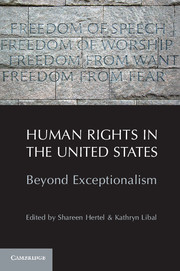Book contents
- Frontmatter
- Contents
- Contributors
- Acknowledgments
- Foreword: Are Americans Human? Reflections on the Future of Progressive Politics in the United States
- 1 Paradoxes and Possibilities: Domestic Human Rights Policy in Context
- SECTION I STRUCTURING DEBATES, INSTITUTIONALIZING RIGHTS
- 2 The Yellow Sweatshirt: Human Dignity and Economic Human Rights in Advanced Industrial Democracies
- 3 The U.S. Welfare State: A Battleground for Human Rights
- 4 Drawing Lines in the Sand: Building Economic and Social Rights Norms in the United States
- 5 State and Local Commissions as Sites for Domestic Human Rights Implementation
- SECTION II CHALLENGING PUBLIC/PRIVATE DIVIDES
- SECTION III FROM THE MARGINS TO THE CENTER: MAKING HARMS VISIBLE THROUGH HUMAN RIGHTS FRAMING
- APPENDIX 1 Universal Declaration of Human Rights
- APPENDIX 2 International Covenant on Economic, Social and Cultural Rights
- APPENDIX 3 International Covenant on Civil and Political Rights
- Index
- References
5 - State and Local Commissions as Sites for Domestic Human Rights Implementation
Published online by Cambridge University Press: 05 June 2012
- Frontmatter
- Contents
- Contributors
- Acknowledgments
- Foreword: Are Americans Human? Reflections on the Future of Progressive Politics in the United States
- 1 Paradoxes and Possibilities: Domestic Human Rights Policy in Context
- SECTION I STRUCTURING DEBATES, INSTITUTIONALIZING RIGHTS
- 2 The Yellow Sweatshirt: Human Dignity and Economic Human Rights in Advanced Industrial Democracies
- 3 The U.S. Welfare State: A Battleground for Human Rights
- 4 Drawing Lines in the Sand: Building Economic and Social Rights Norms in the United States
- 5 State and Local Commissions as Sites for Domestic Human Rights Implementation
- SECTION II CHALLENGING PUBLIC/PRIVATE DIVIDES
- SECTION III FROM THE MARGINS TO THE CENTER: MAKING HARMS VISIBLE THROUGH HUMAN RIGHTS FRAMING
- APPENDIX 1 Universal Declaration of Human Rights
- APPENDIX 2 International Covenant on Economic, Social and Cultural Rights
- APPENDIX 3 International Covenant on Civil and Political Rights
- Index
- References
Summary
States and localities play a critical role in bringing the United States into compliance with its international human rights commitments. The human rights framework embraces the importance of local decision making and implementation, as well as a significant role for subnational incorporation of human rights obligations. Realization of human rights in affected communities requires strong cooperation and collaboration among local, state, and federal governments, and between government and civil society (Melish 2009). Moreover, state and local implementation of human rights may eventually help influence national policy and broader acceptance of international human rights norms (Burroughs 2006, 420–24; Davis 2008a, 436; Powell 2001, 249; Resnik 2006, 1581; Soohoo and Stoltz 2008, 475).
Indeed, human rights treaties are intended to be implemented at the local level with a great deal of democratic input. They provide mechanisms and opportunities for reporting on conditions within communities (both positive and negative), training government officials and agencies as well as the community to promote equality and nondiscrimination, conducting hearings to explore and examine the relevance of findings by international treaty bodies, and issuing recommendations for future action. They also provide a set of standards that local governments should adhere to in administering their own laws and policies.
Subnational implementation of human rights, particularly in areas traditionally reserved for state and local regulation, is also consistent with the U.S. federalist system.
- Type
- Chapter
- Information
- Human Rights in the United StatesBeyond Exceptionalism, pp. 89 - 110Publisher: Cambridge University PressPrint publication year: 2011
References
- 2
- Cited by



